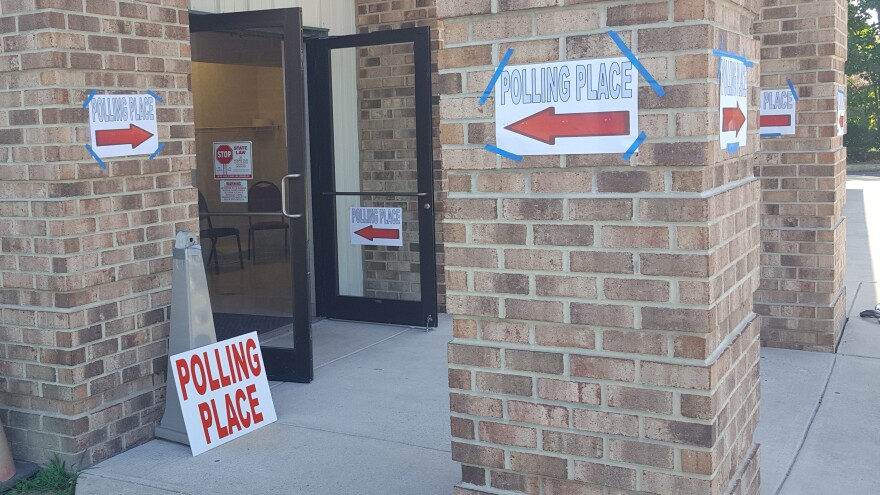Delaware’s presidential primary had little bearing on the party nominees—but was the first time vote-by-mail was used widely in the First State.
Roughly half of Democratic voters in Tuesday’s presidential primary voted absentee, mostly by mail. Just under 30 percent of Republican voters did so. A total of more than 55,700 voters chose the remote option.
The level of absentee voting this presidential primary was more than eleven times what it was in 2016—when overall turnout was higher. This primary was likely a preview of the much more contested fall elections, when every registered Delaware voter will be able to vote by mail without an excuse.
“It certainly reflects, I guess, the voters’ preferences in terms of how they wish to vote, certainly in this election,” said state Election Commissioner Anthony Albence.
Roughly 23 percent of registered Democrats and Republicans voted in Tuesday's presidential primary, compared to around 33 percent in 2016. That year Democrats and Republicans utilized absentee voting at roughly the same rate—around 3 percent.
This year's election also differed in that it featured a limited number of polling places and new touch screen voting machines that had not yet been used in a statewide election.
Manuel Torres was among the Democrats who voted in person Tuesday despite looser absentee voting restrictions put in place because of the coronavirus. Torres said he requested a mail-in ballot, but never got it. This fall, he won’t take any chances.
“I’m gonna make sure that I show up in person,” he said. “I went through this glitch, and come November, it’s very important.”
91-year-old Jane Downs chose to vote in person at Dover High School— because that’s how she’s always done it.
“I’ve been voting for so many years,” she said. “I’m really firm about that.”
Downs, a registered Democrat who remembers marking her ballots by hand, had no problems with the new machines.
“They work pretty good. They’re simple to use,” she said. “Just vote and come on out of there.”
Several other Dover-area voters reported good experiences with the new machines Tuesday. But Adam Hensen, who drives a tugboat in the Delaware Bay, said his machine malfunctioned. Poll workers had to try several times to make the machine print his ballot.
“Definitely a major pain,” he said. “The older system worked a lot better for me.”
Hensen, who declined to identify the candidate he voted for, said he would not vote by mail due to security concerns.
“Letters can be opened,” he said. “Things can be changed or missing.”
Lois Hawkins, a retiree who voted in person Tuesday and declined to identify her party affiliation, also distrusts voting by mail.
“I don’t agree with absentee,” she said “It’s too easy to stop or do a lot of other things. If you show up, you show up, you’re there ... Anybody can send in a written one.”
20-year-old Derek Hallock, who works for Dover High School delivering meals to students, said he will likely vote by mail in November’s general election if he receives an application to do so. The registered Democrat did not get around to voting absentee this election.
“I’m not gonna lie, I did not know how to do an absentee ballot,” said Hallock. “Probably just go online and accept it. But I was just like, I’m here, why not just vote in person.”
Jill Itzkowitz, who leads the Delaware League of Women Voters’ elections and voting committee, says many were confused about how to vote absentee this election.
“I think it was confusing because there did multiple options, they were testing some things out,” she said.
This spring Gov. John Carney expanded the "sick or physically disabled" absentee excuse because of the virus, effectively allowing every registered Democrat or Republican voter to return their ballot by mail, fax or email for the presidential primary. The Department of Elections also mailed absentee ballot applications to all registered primary voters. For a time, voters could mark and return their ballots entirely through the controversial internet-based OmniBallot system made by Democracy Live that the state was piloting. More than 3,500 voters did so before the Department of Elections quietly dropped the pilot in mid-June after additional security concerns were raised. The department then reinstated the option for ballot marking only about a week later.
Albence of the Department of Elections says he does not think confusion or issues with absentee ballots reaching voters were widespread in the presidential primary. Despite the pandemic and concerns about a shortage of poll workers, he saw Tuesday’s election as a success.
“I know it’s challenging whenever there’s change,” he said. “But those consolidated polling places generally overall worked well. There was really no wait time to speak of.”
Albence says his department will work on recruiting more poll workers and further automating the processes around mail-in ballots for the fall elections.
He says the department consulted with elections security researchers, Democracy Live and the state’s Chief Information Security Officer before reinstating the OmniBallot option for some absentee voters this primary. They followed the researchers’ recommendations in moving the ballot marking function to the client side, as opposed to the server side, and disabled the electronic return option, Albence says.
The Department of Elections plans to continue making additional security enhancements for the fall with the help of the state Department of Technology and Information.
Albence declined to specify what security changes the state agencies are looking into, saying officials are “still developing them.”
This story has been updated with a more recent count of votes submitted through the Democracy Live platform from the Department of Elections, as well as to include statistics on turnout and absentee voting in 2016.









